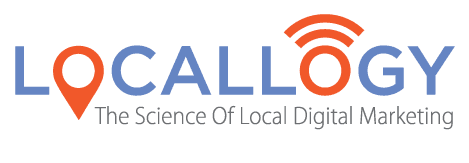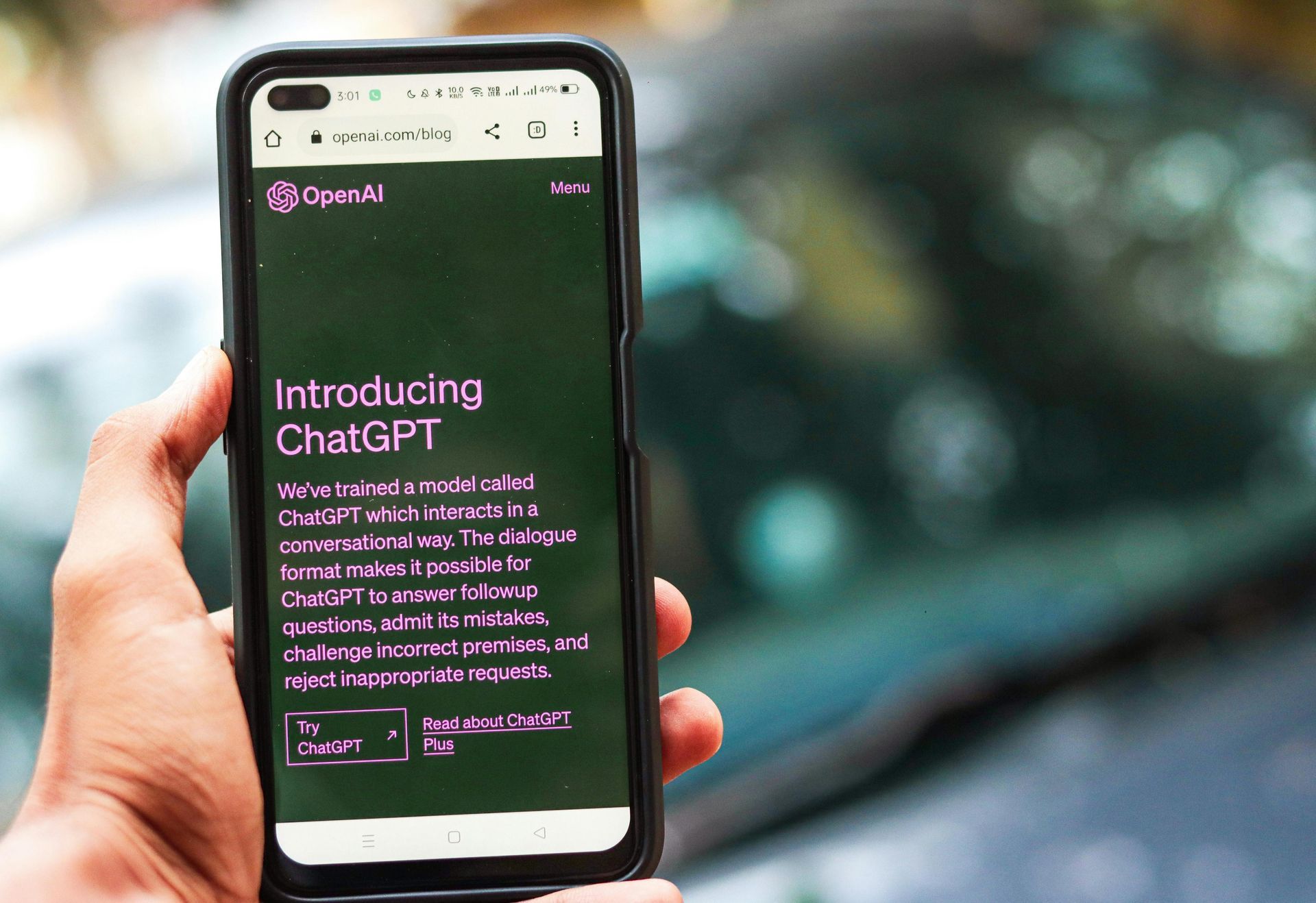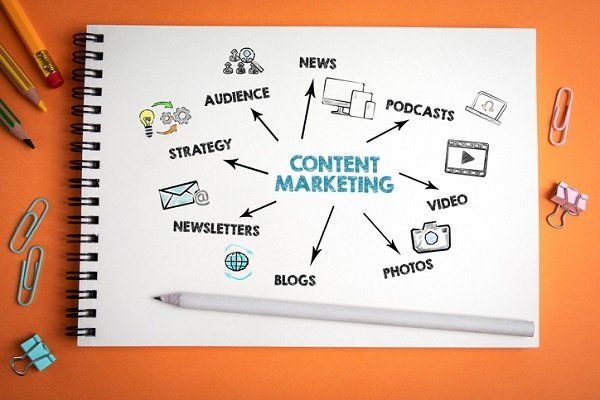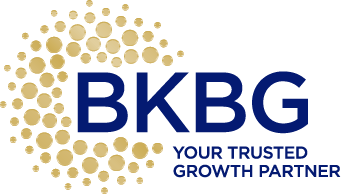Website Optimization for AI Search: A Future-Proof Guide for 2025 and Beyond
The digital landscape is shifting beneath our feet, and if you're a local business owner, you've probably noticed something different about how customers find you online. Instead of relying only on Google, more people are now discovering businesses through AI-driven searches on platforms like Gemini, ChatGPT, and other generative AI engines.
AI driven search is changing the rules, reshaping not only what people look for but also how these platforms gather, interpret and highlight information from your website.
If you have been wondering why your trusted SEO strategies are not bringing in the same results they once did, or you have heard terms like AI search and ChatGPT browsing but are not sure what they mean for your business, you are in the right place. This guide will walk you through how to optimize your website for the AI powered future of search and help your business stand out in this new landscape.
Table of Contents
- Why AI Search Is Changing the SEO Game
- What Are AI Agents and LLMs - And Why They Matter for SEO
- Key Elements of an AI-Optimized Website
- Technical SEO Tips to Future-Proof Your Site
- How Website Builders Like Duda Are Adapting for AI Search
- Content Strategies That Align with AI-Driven Queries
- Is Your Website Ready for the Future of AI Search?
- Final Thoughts: Stay Ahead of the AI Curve
Why AI Search Is Changing the SEO Game
Remember when SEO was primarily about stuffing your web pages with the right keywords? Those days are quickly becoming history. The evolution from traditional search to AI-powered search represents the most significant shift in digital marketing since Google first launched over two decades ago.
Traditional search engines operated on relatively simple principles: they crawled websites, indexed content based on keywords, and returned results primarily based on keyword matching and link authority. If someone searched for "best pizza Columbus Ohio," the search engine would look for pages containing those exact words and rank them based on various factors like keyword relevance and website authority, then display a list of blue links for users to click and explore.
AI-powered search engines work fundamentally differently. Instead of just matching keywords, they understand context, intent, and nuance. When someone searches for "where can I get great pizza near me for my daughter's birthday party," an AI search engine doesn't just look for those exact words. It understands that this person is planning a celebration, wants quality food, needs location-specific results, and is likely looking for family-friendly options with good portions or party packages. Based on this understanding, the AI might directly recommend specific pizzerias known for family dining, highlight restaurants that offer party packages or large orders, and even suggest optimal ordering times—all presented as a conversational response rather than a simple list of links.
This shift toward natural language processing and contextual understanding means that AI agents can interpret conversational queries the way humans interpret them. Modern AI-driven tools can now analyze user queries with unprecedented sophistication, drawing from vast training data to understand context and intent. This means that instead of forcing people to think like search engines, search engines are learning to think like people.
AI agents and large language models (LLMs) such as GPT, Gemini, and Claude are now built into many search tools, including ChatGPT’s browsing feature, Google’s AI Overviews, and AI‑focused search engines like Perplexity and Arc Search. Instead of simply showing a list of links, these systems pull information from many different sources, analyze it, and present it as a clear, conversational answer. When someone turns on Google’s AI mode or uses an AI chatbot, they are seeing a response that has been synthesized and explained by generative AI rather than just ranked by keywords or links.
This means the search experience itself has changed. Users can ask questions in natural, conversational language, and the AI interprets context, remembers previous searches, and tailors answers to what it predicts will be most useful. Rather than forcing users to sort through multiple pages, the AI delivers a single, cohesive response built from content across the web.
For local business owners, this shift brings both opportunity and challenge. AI search engines are excellent at understanding local intent—such as finding a nearby service or a business that fits specific criteria—and they often recommend businesses that provide detailed, trustworthy, and well‑structured information online. The challenge is that traditional SEO tactics alone are no longer enough. To show up in these AI‑generated answers, your website and overall online presence need to be optimized in a way that makes your information easy for these systems to understand, combine, and present. This means structuring your content with clear headings, using specific details about your services and location, and maintaining consistent business information across all platforms. When AI systems can easily extract and verify your information, they're more likely to include your business in their recommendations to users.
What Are AI Agents and LLMs - And Why They Matter for SEO
To optimize effectively for AI search, you first need to understand what you're optimizing for. AI agents are sophisticated software systems that can understand, process, and respond to human queries using artificial intelligence. Think of them as highly intelligent assistants that can read and comprehend information across the entire internet, then provide thoughtful, contextual responses.
Examples of AI agents in search include:
- Perplexity AI: A search engine that provides direct answers with source citations.
- ChatGPT with browsing: OpenAI's conversational model that can search the web in real-time.
- Google's AI Overviews: Google's integration of AI-generated answers directly in search results.
- Bing Chat: Microsoft's AI-powered search companion integrated with Bing.
- Arc Search: A modern browser that integrates AI-powered search capabilities.
Large Language Models (LLMs) are the brain behind these AI agents. These are massive neural networks trained on vast amounts of text data, enabling them to understand and generate human-like responses. Each AI model has been trained in different training data sets, which influences how they interpret and respond to specific queries. The key difference between LLMs and traditional search algorithms is that LLMs interpret intent, not just keywords.
Here's a practical example: If a potential customer searches for "reliable plumber near me who won't overcharge," a traditional search engine might focus on the keywords "plumber" and location data. In contrast an AI agent powered by an LLM understands that this person is specifically concerned about trustworthiness and fair pricing and will prioritize results that demonstrate these qualities through customer reviews, transparent pricing, and professional credentials. The long and short of it is that the AI features built into modern search platforms can analyze these nuanced user queries to provide more relevant responses.
This shift toward intent-based understanding has massive implications for how you should present your business online. Instead of focusing solely on keyword density, you need to focus on factual clarity and structured content that clearly communicates who you are, what you do, and why customers should choose you.
Additionally, AI agents excel at synthesizing information from multiple sources to provide comprehensive answers. This means they're not just looking at your website in isolation; they're considering your entire online presence, including reviews, social media, directory listings, and mentions across the web. The generative AI capabilities allow these systems to create cohesive responses from all of this information, so the clearer and more consistent your online presence is, the more likely your business will be accurately represented in AI search results.
Key Elements of an AI-Optimized Website
Creating an AI-optimized website requires a fundamental shift in how you think about content and structure. While traditional SEO focused heavily on keywords and backlinks, AI optimization prioritizes clarity, context, and comprehensive information that directly addresses user intent. Let's explore the specific elements that make websites perform well in this new AI-driven search environment.
Semantic SEO and Entity-Based Optimization
Semantic SEO is the practice of optimizing content around topics and concepts rather than individual keywords. This approach is particularly important for local businesses because AI agents understand the relationships between different concepts, allowing them to recognize when your content comprehensively covers a topic even without repeating the same keywords multiple times.
Why keyword stuffing doesn't work anymore: AI agents can easily identify when content is artificially stuffed with keywords, and they actually penalize this approach. These advanced systems instead prioritize natural, conversational content that genuinely addresses user questions. For example, instead of repeating "Columbus Ohio dentist" fifty times on your page, focus on naturally discussing your dental services, your Columbus location, patient care philosophy, and specific treatments you offer. This creates content that flows naturally while still signaling relevance to AI systems.
Entity-based optimization builds on this concept by helping AI agents understand the key entities (people, places, businesses, concepts) mentioned in your content. This is where schema markup and structured data become invaluable tools for local businesses. Schema markup is code that you add to your website to help search engines understand the specific details about your business, services, and content.
For local businesses, essential schema markup includes:
- LocalBusiness schema with your name, address, phone number, hours, and services.
- Review schema to properly display customer feedback.
- FAQ schema for frequently asked questions.
- Service schema detailing what you offer.
- Organization schema establishing your business credentials.
E‑E‑A‑T signals (Experience, Expertise, Authoritativeness, Trustworthiness) are more important than ever in the context of AI search. Generative AI tools are designed to pull from sources they interpret as credible, so they actively prioritize content that demonstrates authority and reliability when building responses for users. In other words, if your website and broader online presence clearly reflect strong E‑E‑A‑T signals, AI agents are more likely to surface your business in their summarized answers.
For local businesses, this means:
- Experience: Showcasing real customer experiences through detailed case studies, before‑and‑after photos, and genuine testimonials gives AI clear proof points it can reference.
- Expertise: Demonstrating your knowledge through in‑depth service descriptions, educational resources, and professional credentials signals to AI that your site is a trusted source on the topic.
- Authoritativeness: Building citations from reputable local directories, professional associations, and industry publications increases the likelihood that AI tools will view your content as a go‑to resource.
- Trustworthiness: Maintaining consistent business information across all platforms, encouraging authentic reviews, and being transparent about pricing and policies reinforces the reliability AI systems look for when selecting information.
Contextual Content & Answer-Focused Structure
AI agents excel at understanding context, which means your content should anticipate and answer the full context of customer queries, not just provide basic information. In an AI‑driven search environment, engines favor pages that cover a topic in depth because it helps them generate richer, more accurate answers. The actual search experience now expects comprehensive answers rather than simple keyword matches.
Writing for queries, not just keywords means thinking about the complete customer journey. Instead of creating a page that simply lists your services, create content that addresses the questions and concerns customers have at each stage of their decision-making process. AI chatbots and search agents evaluate how well your content satisfies these layered questions when deciding what to show users.
For example, if you're a local contractor, instead of just listing "kitchen remodeling" as a service, create content that addresses:
- "How long does a kitchen remodel take in Columbus?"
- "What permits do I need for kitchen renovation in Ohio?"
- "How much should I budget for a mid-range kitchen remodel?"
- "What questions should I ask potential contractors?"
- "How do I prepare my home for a kitchen renovation?"
- "What are the most popular kitchen trends in Central Ohio?"
Similarly, a local dental practice might address:
- "What should I expect during my first visit to a new dentist?"
- "How often should I schedule dental cleanings?"
- "Do you accept my dental insurance plan?"
- "What are the signs that I need emergency dental care?"
- "How can I help my child feel comfortable at the dentist?"
- "What payment options do you offer for major dental work?"
By answering these kinds of detailed, real‑world questions, your content signals to AI systems that your business is a relevant and trustworthy source for nuanced, intent‑driven searches. The AI features in modern search platforms reward this type of thorough, helpful content that improves user engagement.
Clear headings, bullet points, and answer boxes help AI agents quickly understand and extract relevant information from your content. These structural elements make it easier for AI systems to parse your site and surface key details in their responses.
Structure your content with:
- Descriptive H2 and H3 headings that clearly indicate what each section covers.
- Bullet points for lists of services, features, or benefits.
- FAQ sections that directly answer common customer questions.
- Summary boxes that highlight key information.
Using AI tools to optimize for AI agents creates a powerful feedback loop. Tools like ChatGPT, Claude, or Gemini can help you understand how AI agents interpret your content and identify areas for improvement. Try inputting your content into these tools and asking them to summarize your services or answer customer questions based on your website content. The way these tools respond can reveal how clearly your site communicates with AI, and where you can make adjustments to strengthen your visibility in AI search results.
How Website Builders Like Duda Are Adapting for AI Search
The rise of AI search has prompted significant innovations in website building platforms, with some leading the charge in AI-ready features and capabilities. Duda, in particular, has been making strategic updates to help businesses create websites that perform well in the AI search landscape.
Recent Duda updates have focused on several key areas that directly help AI tools read, understand, and feature your site in their answers:
Improved Schema Markup Integration
Duda now makes it easier to implement comprehensive structured data across your website without requiring technical expertise. This matters because AI agents rely heavily on structured data to pull details like your services, hours, and customer reviews into the results they show people. The platform's AI features help automate much of this process.
Enhanced Mobile Responsiveness
Recognizing that AI agents prioritize mobile-friendly content, Duda has refined its responsive design capabilities to ensure websites look and function perfectly across all devices. Since most AI‑driven searches happen on phones, a mobile‑optimized site increases the chances your business will be recommended. This includes faster loading times on mobile connections and touch-friendly navigation elements that improve the user's actual search experience.
Content Optimization Tools
Duda's platform now includes features that help users create content that's naturally optimized for AI search, including suggested content structures, FAQ builders, and review integration tools that help establish E-E-A-T signals. These features make it easier for AI systems to see your site as reliable and worth including in their summaries.
Advantages of no-code platforms for structured content become particularly apparent in the AI era. Platforms like Duda allow business owners to implement advanced SEO features that would traditionally require developer expertise:
- Automated Schema Generation: The platform can automatically generate appropriate schema markup based on your business type and content.
- Consistent Structure: Templates ensure that important information like contact details, hours, and services are presented consistently across all pages.
- Built-in SEO Features: Features like automatic image optimization, meta tag management, and mobile optimization happen behind the scenes.
Duda vs. traditional CMS for AI-readiness reveals some interesting advantages for businesses focused on local search:
Traditional content management systems often require plugins, custom code, or developer intervention to implement AI-friendly features. Duda and similar modern website builders integrate these features natively, making them more accessible to small business owners who need results without technical complexity. Its integration with generative AI tools also helps streamline content creation and ensures your site can keep up with how AI engines gather and display information.
The platform's focus on local business optimization aligns well with AI search trends. Features like location page builders, review integration, and local schema markup are built into the platform rather than requiring additional tools or expertise. This makes it easier for AI agents to pull accurate, location‑specific details about your business when people search.
However, it's important to note that any website platform can be optimized for AI search with the right approach. The key is ensuring that your chosen platform allows you to implement structured data, create clear content hierarchies, optimize for mobile, and maintain fast loading speeds.
Content Strategies That Align with AI-Driven Queries
Creating content that resonates with AI agents requires a shift from traditional keyword-focused writing to intent-focused content creation. AI agents are sophisticated enough to understand the underlying questions and concerns behind search queries, so optimizing your website for AI search means writing content that answers these questions in depth and in a way AI systems can easily use.
Answering ‘People Also Ask’ and conversational questions has become more important than ever. AI agents often pull information to answer follow-up questions that users might have, even if they didn't explicitly ask them. By building this kind of Q&A content into your site, you make it easier for AI search tools to feature your pages in their responses.
The AI search experience now also includes predictive responses based on previous searches and related user queries. For local businesses, this means anticipating the full customer journey in your content.
For example, if you're a local veterinarian, don't just list your services. Address questions like:
- "What should I expect during my pet's first visit?"
- "How do I know if my pet's symptoms require emergency care?"
- "What vaccinations does my puppy need and when?"
- "How much do common veterinary procedures cost?"
- "Do you offer payment plans for expensive treatments?"
Including answers like these on your site signals to AI agents that your business offers the detailed, trustworthy information they prioritize.
Additionally, using NLP tools to shape AI-relevant content can significantly improve your optimization efforts. Tools like Frase, Surfer SEO, and even ChatGPT can help you understand what topics and questions should be covered comprehensively for any given subject. These tools reveal how AI systems interpret subject matter, helping you adjust your site content so AI can more confidently present it in search results.
Here's a practical workflow for AI-optimized content creation:
- Start with customer questions: Use tools like AnswerThePublic, Google's People Also Ask, or feedback from real customers to uncover common questions. Publishing clear answers on your website makes it easier for AI systems to surface your content.
- Create comprehensive topic clusters: Instead of individual pages targeting single keywords, create content clusters that thoroughly cover related topics.
- Use conversational language: Write as if you're having a helpful conversation with a potential customer, not trying to manipulate search algorithms. AI engines favor natural language they can interpret and quote directly.
- Include specific, local details: AI agents excel at providing contextual recommendations, so include location-specific information, local partnerships, and community involvement. This helps your business appear in local AI‑powered search results.
- Update and refresh regularly:
AI agents favor fresh, current information, so maintain your content with regular updates, Fresh content helps AI trust and prioritize your pages.
Refreshing and re-optimizing content for evolving AI behaviors should be an ongoing process. AI search capabilities continue to evolve rapidly, and content that performed well six months ago might need updates to maintain its effectiveness. Regular updates keep your site aligned with how AI engines currently evaluate and rank information.
Monitor how AI agents currently respond to queries related to your business by:
- Searching for your services in ChatGPT, Perplexity, and Google's AI Overviews.
- Testing Arc Search and other AI-powered browsers to see how they present your business.
- Noting which competitors or information sources they cite.
- Identifying gaps in the information they provide.
- Creating content that fills these gaps comprehensively so AI tools see your site as the better answer.
Local relevance amplification becomes crucial in AI search because these systems excel at understanding and providing location-specific recommendations. AI chatbots and search agents use sophisticated location understanding to provide relevant results. Include details about:
- Your specific service areas within your city or region
- Local landmarks, neighborhoods, or areas you serve
- Community involvement and local partnerships
- Region-specific challenges or considerations in your industry
- Local regulations, permits, or requirements that affect your services
Seasonal content optimization can significantly improve your AI search visibility during peak business periods. Many local businesses experience seasonal fluctuations, and AI agents are increasingly sophisticated at understanding temporal context. A landscaping company should create content about "spring cleanup services in Columbus" before spring arrives, while a tax preparation service should optimize for "tax filing deadlines Ohio" content in early winter. Proactive seasonal content helps AI recognize your business as timely and relevant.
Customer journey mapping for AI
content involves creating content for each stage of the customer decision process. Generative AI systems often provide comprehensive responses that address multiple customer concerns simultaneously, so having content that covers awareness, consideration, and decision stages helps ensure your business appears in these comprehensive responses. This approach also improves user engagement by providing valuable information at every stage.
For awareness stage content, address problems customers might not know they have: "Signs your HVAC system needs attention before winter." For the consideration stage, compare different approaches: "Central air vs. ductless systems for Columbus homes." For the decision stage, address specific concerns: "What to expect during HVAC installation day."
Is Your Website Ready for the Future of AI Search?
With all the changes happening in AI search, it's important to assess where your website currently stands and identify areas for improvement. The checklist below shows what to look for when optimizing your site so AI systems can understand it, trust it, and include it in their results.
Content and Structure Assessment
✓ Clear Business Information
• Is your business name, address, phone number, and hours clearly displayed on every page?
• Do you have a dedicated "About" page that explains your experience and expertise?
• Are your services described in detail with clear explanations of what's included?
• Do you have customer testimonials and reviews prominently displayed?
✓ Question-Focused Content
• Does your content answer the questions customers ask during phone calls or consultations?
• Have you created FAQ sections that address common concerns and specific queries?
• Do your service pages explain not just what you do, but why customers need it?
• Is your content written in natural, conversational language that AI systems can easily interpret and quote?
✓ Local Optimization
• Do you mention your specific service areas and locations throughout your content?
• Have you created location-specific pages if you serve multiple areas?
• Do you reference local landmarks, events, or community involvement?
• Are your business listings consistent across Google My Business, Yelp, and other directories?
Technical Foundation Check
✓ Mobile Performance
• Does your website load quickly on mobile devices, providing a good actual search experience?
• Are all buttons, forms, and navigation elements easily usable on smartphones?
• Is your contact information easily accessible from any page on mobile?
• Do images and videos display properly on all screen sizes?
✓ Schema Markup Implementation
• Have you implemented LocalBusiness schema markup that AI tools can easily parse to understand your details?
• Do you use Review schema to display customer feedback?
• Are your services marked up with appropriate schema types?
• Have you implemented FAQ schema for question-and-answer content?
✓ Site Architecture
• Is your navigation menu clear and logical for both users and AI agents?
• Do you have a current XML sitemap submitted to search engines?
• Are your important pages linked from your homepage?
• Do you use descriptive, keyword-rich URLs for all pages?
AI-Specific Optimization Elements
✓ Comprehensive Topic Coverage
• Do your service pages cover all aspects of what customers need to know?
• Have you created content that addresses the entire customer journey?
• Do you explain your process, timeline, and what customers can expect?
• Have you addressed common objections or concerns that appear in user queries?
✓ Authority and Trust Signals
• Do you display professional certifications, licenses, or memberships?
• Are customer reviews and testimonials prominently featured?
• Do you have case studies or examples of your work?
• Is your business information consistent across all online platforms?
✓ Conversion Optimization
• Are your contact methods (phone, email, forms) easily accessible?
• Do you have clear calls-to-action on every page?
• Have you made it easy for customers to schedule appointments or request quotes?
• Do you offer multiple ways for customers to get in touch?
Regular Monitoring and Maintenance
Monthly Tasks
• Check your website's loading speed using tools like Google PageSpeed Insights.
• Review and respond to new customer reviews across all platforms.
• Update business hours, services, or pricing as needed.
• Monitor your Google My Business insights and optimization opportunities.
• Test how AI agents respond to queries about your services using ChatGPT, Arc Search, or Perplexity.
• Check for broken links or outdated information on your website.
• Test your AI search experience by searching for your business in Google AI mode.
Quarterly Tasks
• Audit your content for accuracy and freshness.
• Review competitor websites and AI search results for your services.
• Test your website's functionality across different devices and browsers.
• Analyze which pages generate the most leads and optimize similar content.
• Update your FAQ sections based on new customer questions and previous searches.
• Review and refresh your customer testimonials and case studies.
• Evaluate how AI chatbots present your business information and adjust as needed.
Annual Tasks
• Comprehensive review of all schema markup and structured data.
• Complete audit of your online business listings and directory presence.
• Review and update your content strategy based on customer feedback and questions.
• Consider major updates or improvements to your website design and functionality.
• Analyze your year-over-year search performance and identify growth opportunities.
• Plan a content calendar for the upcoming year based on seasonal business patterns.
• Assess how AI features and new generative AI tools might impact your industry and update your site accordingly.
Final Thoughts: Stay Ahead of the AI Curve
The transition to AI-powered search represents evolution, not disruption. For local business owners, this shift actually presents more opportunities than challenges. AI agents excel at understanding local intent and providing personalized recommendations, which play directly to the strengths of community-focused businesses.
Optimizing your website for AI search ensures that when these systems build their answers, your business has the best chance of being included. The AI search experience continues to evolve rapidly, with new AI features and capabilities being introduced regularly.
With all the changes happening in AI search, it's important to assess where your website currently stands and identify areas for improvement. The checklist below shows what to look for when optimizing your site so AI systems can understand it, trust it, and include it in their results.













